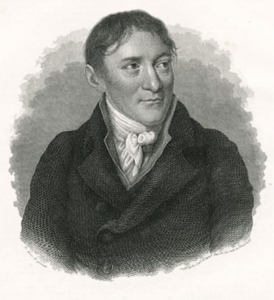To the sun
(Poet's title: An die Sonne)
Set by Schubert:
D 272
[August 25, 1815]
Königliche Morgensonne,
Sei gegrüßt in deiner Wonne,
Hoch gegrüßt in deiner Pracht!
Golden fließt schon um die Hügel
Dein Gewand; und das Geflügel
Eines jeden Waldes wacht.
Alles fühlet deinen Segen;
Fluren singen dir entgegen,
Alles wird Zusammenklang:
Und du hörest gern die Chöre
Froher Wälder, o so höre,
Hör’ auch meinen Lobgesang.
Hohe Göttin, ich empfange
Mit frohlockendem Gesange
Hier in meiner Stille dich!
Deine erste Lockerrose
Strahlte warm ins Liebgekose
Meine Träum´ und weckte mich.
Mit bestrahltem Angesichte
Steh ich da in deinem Lichte;
Allerwärmelnd lächelst du,
Wie die Gottheit, deine Klarheit
Hier dem Wahn und dort der Wahrheit,
Duldender als Menschen, zu.
Du erheiterst mit der Fülle
Deiner Gottheit meine Stille,
Wie den Pomp des Fürstensaals.
Sei gesungen! Hochgesungen!
Hochgepriesen von den Zungen
Jedes Hügels, jedes Tals.
Royal morning sun,
Greetings to you in your bliss,
A special greeting in your splendour!
Already flowing with gold, around the hill
Come your garments, and the winged creatures
Of each forest are waking up.
Everything feels your blessing;
Meadows are singing to you,
Everything is becoming harmony:
And since you enjoy listening to the choruses
Of happy woods, in the same way listen,
Listen also to my song of praise.
Exalted goddess, I welcome,
With a song of delight
Here in my quietness, I welcome you!
The first pink that you let loose
Shone warmly into the words of love
In my dream and woke me up.
With an illuminated face
I stand there in your light;
Warming everything, you smile
Like divinity, your clarity smiling on
Madness here and truth there,
Smiling on it, more tolerant than humans.
You brighten up, with the fullness
Of your divinity, my quietness,
Like the display in princely rooms.
Let it be sung! Sung out loud!
Greatly lauded by the tongues
Of each hill, each valley.
All translations into English that appear on this website, unless otherwise stated, are by Malcolm Wren. You are free to use them on condition that you acknowledge Malcolm Wren as the translator and schubertsong.uk as the source. Unless otherwise stated, the comments and essays that appear after the texts and translations are by Malcolm Wren and are © Copyright.
☙
Themes and images in this text:
Birds Dreams Faces Fields and meadows Gold Harmony Hills and mountains Light Listening Madness Morning and morning songs Noise and silence Roses and pink Songs (general) The sun Valleys Waking up Woods – large woods and forests (Wald)
There is synaesthethesia at work here. The rising sun changes the colours and general appearance of the world but it also listens and hears. As the golden morning light touches the hills and the woods, it sets off the birds’ dawn chorus. The pink light of dawn somehow interrupts a conversation heard in the poet’s dream. On waking up he joins the chorus with a hymn of praise and ‘everything becomes harmony’. Nature’s response to the sun’s visual display is oral: each hill and valley has a ‘tongue’ to sing a suitable song of praise.
There is a strange absence of reference beyond the immediate experience of early morning. We are given no hint that what is being celebrated is a new dawn politically or spiritually, as in many such aubades. There is nothing explicitly about the night (death? superstition? depression?) that has now come to an end, and no looking forward to the benefits in store later in the day (requited love? a new world order? eternal life in heaven?). The only suggestion that the imagery of sunlight might point beyond itself is in the penultimate stanza, where the poet is illuminated or ‘enlightened’ by a sun that looks and smiles on the world in a much more tolerant way than do humans. Since the poem was probably written in 1794 at the time of the Terror in France, there may be a reference to the promise and the limitations of ‘the Englightenment’ project and the French Revolution itself: ‘here madness and truth there’. Attempting to share the sun’s patience and tolerance, the poet does not make a judgement on whether the attempt to renew society is based on a concern for truth or is a form of madness.
☙
Original Spelling An die Sonne Königliche Morgensonne, Sei gegrüßt in deiner Wonne, Hochgegrüßt in deiner Pracht! Golden fließt schon um die Hügel Dein Gewand; und das Geflügel Eines jeden Waldes wacht. Alles fühlet deinen Segen; Fluren singen dir entgegen, Alles wird Zusammenklang: Und du hörest gern die Chöre Froher Wälder, o so höre, Hör' auch meinen Lobgesang. Hohe Göttin, ich empfange Mit frohlockendem Gesange Hier in meiner Stille dich! Deine erste Lockerrose Stralte warm ins Liebgekose Meine Träum´ und weckte mich. Mit bestraltem Angesichte Steh ich da in deinem Lichte; Allerwärmelnd lächelst du Wie die Gottheit, deine Klarheit Hier dem Wahn und dort der Wahrheit, Duldender als Menschen, zu. Du erheiterst mit der Fülle Deiner Gottheit meine Stille, Wie den Pomp des Fürstensaals. Sei gesungen! Hochgesungen! Hochgepriesen von den Zungen Jedes Hügels, jedes Thals.
Confirmed by Peter Rastl with Schubert’s source, Taschenbuch zum geselligen Vergnügen herausgegeben von W.G. Becker. für 1795. Mit Churfürstl. Sächsischem Privilegio. Leipzig, bei Voß und Compagnie, pages 223-224.
To see an early edition of the text, go to page 223 [305 von 442] here: http://digital.onb.ac.at/OnbViewer/viewer.faces?doc=ABO_%2BZ251544301


